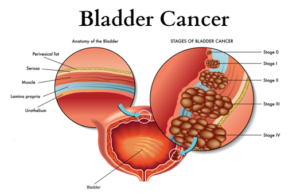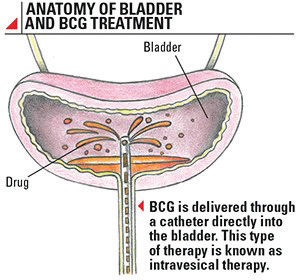Bladder cancer accounts for about 5% of all new cancers in the US. It is the fourth most common cancer in men, but it is less common in women. In 2017 The American Cancer Society estimated 79,030 new cases of bladder cancer (about 60,490 in men and 18,540 in women).
Most cancers that originate in the bladder start in the urothelium or transitional epithelium, the innermost lining. As the cancer progresses, it grows through other layers of the bladder wall and may even extend outside the bladder and infiltrate other parts of the body and nearby lymph nodes.
What are the Symptoms of Bladder Cancer?
Symptoms of bladder cancer include frequent, painful urination, persistent urinary tract infections, and the occurrence of blood in urine (hematuria). At a more advanced stage, pain around the kidneys, swelling of the lower legs and a pelvic growth could indicate bladder cancer. Weight loss, bone pain and anemia are also symptoms.
Who’s at Risk?
Bladder cancer is 3x more common in men than in women, and Caucasians are 2x as likely to develop bladder cancer than African Americans or Hispanics. Risk also increases as you get older and if you have a family history. Smoking is the greatest risk factor for bladder cancer. The good news is you can reduce your risk if you quit.
How is Bladder Cancer Diagnosed?
If bladder cancer is suspected, these tests may be performed to diagnose the disease:
Where Do You Go For Treatment?
Premier Medical Group’s Bladder Cancer Program offers many advantages for patients diagnosed with bladder cancer, including access to a dedicated team of highly skilled urologists, medical oncologists, and treatment specialists who will focus on providing you optimal care from diagnosis to active treatment, and recovery. Premier Medical Group provides leading edge care and therapies to ensure the best outcomes for bladder cancer patients.
Premier’s multidisciplinary team of bladder cancer specialists is led by Dr. Scott Kahn – Medical Director of the Bladder Cancer Program.
“From the initial diagnosis of bladder cancer, our patients often require years if not lifetime monitoring. Our team is committed to coordinating and managing each patients care so they get the most optimal treatment for their particular case, close to home. We pride ourselves on having a close relationship with our patients and their referring providers. We strive to ensure that every patient’s experience is safe, secure and friendly,” says Dr. Kahn.
Premier Medical Groups’ Bladder Cancer Program also works directly with Premier’s Research Program, which allows patients access to advanced bladder cancer treatments not offered at other facilities in the area.
How is Bladder Cancer Treated?
One of the most common medications used to treat bladder cancer at Premier is Bacillus Calmette-Guérin (BCG). BCG is a live vaccine, which is given to treat early-stage bladder cancer and helps prevent the cancer from recurring. When the medication is put into the bladder it causes inflammation. This inflammation destroys tumors and cancerous cells, therefore helping to stop the cancer from growing and spreading.
prevent the cancer from recurring. When the medication is put into the bladder it causes inflammation. This inflammation destroys tumors and cancerous cells, therefore helping to stop the cancer from growing and spreading.
BCG instillation is done by inserting a catheter into the opening of the urethra, then into the bladder. When the catheter is in the bladder, BCG will be passed through the catheter into the bladder. The medication should be retained in the bladder for two hours to obtain the best results. The usual course of treatment is once a week for 6 weeks.
For more advanced types of bladder cancers, other options may include surgery to remove the entire bladder, chemotherapy with or without radiation treatment, chemotherapy if cancer has spread to lymph nodes, and immune system modifying drugs which are the newest types of therapies to enhance the body’s own immune system to fight the cancer. These newest therapies have shown great promise in treating advanced disease, reducing complications and prolonging life.
The goal of Premier’s Bladder Cancer Program is to help tailor the proper treatment to the patient’s condition, improve their overall quality of life and cure their cancer.
To learn more about Premier’s Bladder Cancer Program please call #(845) 437-5000
